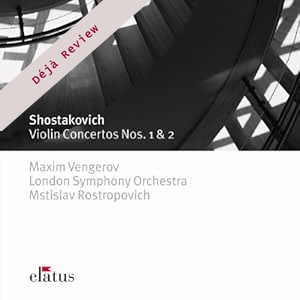
Déjà Review: this review was first published in December 2002 and the recording is still available.
Dmitri Shostakovich (1906-1975)
Violin Concerto No 1, Op 77 (Op 99) (1948-55)
Violin Concerto No 2, Op 129 (1967)
Maxim Vengerov (violin)
London Symphony Orchestra/Mstislav Rostropovich
rec. 1994 (No 1), 1996 (No 2), Abbey Road Studios, London
Elatus 0927 467422 [73]
These performances were widely admired in their original issues, on separate CDs with other repertoire, but it seems most sensible to have the two Shostakovich violin concertos coupled together on a single CD. Vengerov performs both of them with consummate artistry, and well did he deserve the accolade of ‘Record of the Year’ which he gained for the First Concerto on its original release in 1995.
This work is unusual in having two designated opus numbers, the composer having withdrawn the work around the time of the 1948 Congress of Soviet Composers. At this notorious event the major figures of Soviet music – Prokofiev, Khachaturian, Miaskovsky, Shostakovich – were roundly denounced by Stalin’s henchman Zhdanov, since the Party viewed their compositions as examples of ‘individualism’ and ‘bourgeois decadence’.
It was a full seven years later, two years after Stalin’s death, that the premiere of the concerto took place. The soloist, and the work’s dedicatee, was the legendary David Oistrakh, who had advised Shostakovich on technical matters relating to the violin part. But while the music certainly makes many demands on the player’s technique, the expressive qualities of the material always take priority.
Vengerov’s performance is likely to be the greatest since Oistrakh, although in fairness Hilary Hahn has been identified strongly with the piece quite recently. The music has a wide expressive and technical range, much of it uncompromisingly slow and introspective. If anything, this aspect is more demanding for the player than the more obviously virtuoso fast section. And it is here that the warm and secure tone of Vengerov really pays dividends. His performance is thoughtful and deeply felt. Therefore the arrival of the finale is an entirely logical result of all that has gone before, and for the listener the experience grows with each hearing. For this is a magnificent work, revealing the composer at the height of his powers.
The Violin Concerto No 2 is probably the least familiar of all the Shostakovich concertos, though it is certainly as fine a composition as its companions. It was written in 1967, twenty years after the Concerto No 1, and was intended as a sixtieth birthday present for Oistrakh. The composer miscalculated, however, for the dedicatee was still a mere fifty-nine when he gave the first performance in October that year.
In its general outlook, the score is typical of Shostakovich’s later music, the spare textures reflecting the intensity of feeling which obsessed him after he had suffered a severe heart attack in 1966. The meditation with which the Concerto begins sets the tone, just as the equivalent movement in the Concerto No 1. Shostakovich described this theme as the ‘betrayal motif’, which was possibly a reference to the harsh Brezhnev regime and its treatment of dissidents who were in many cases his friends. But soon the despair of this lyrical meditation transforms the motif into a frenetic, even grotesque, rhythmic activity; and these somewhat disconcerting shifts of mood, which form a fundamental aspect of the composer’s style, recur throughout the composition. The sinister pantomime is emphasised by the extremities of the scoring: at one point, the soloist shares a competitive duo with beating tom-toms.
This music is highly charged and a worthy successor to its illustrious predecessor. Again, Vengerov’s technique is flawless, but more important, his understanding of the music is palpable. The expressive range is effortlessly but meaningfully conveyed, with tempi expertly thought through, for which all praise to the composer’s friend Mstislav Rostropovich. The LSO are on top form throughout, but inevitably it is the playing and interpretations of Maxim Vengerov that steal the show.
Terry Barfoot
Buying this recording via a link below generates revenue for MWI and helps us keep free access to the site



















